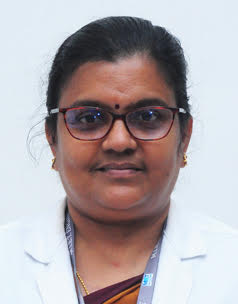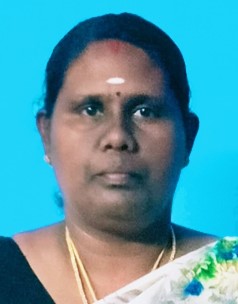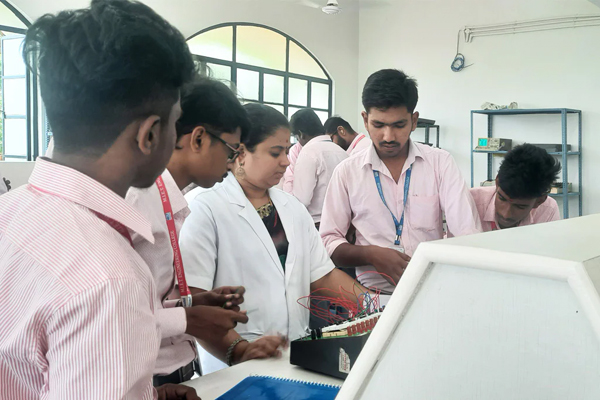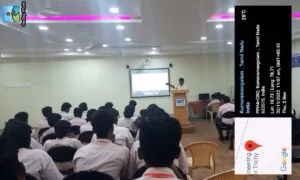The Department of Biomedical Engineering is launched in the year 2022 with an Undergraduate Programme B.E. in Biomedical Engineering.
The field of Biomedical Engineering focuses on applying engineering concepts and methods to medicinal and biological issues.
The prevalence of implantable medical devices, such as pacemakers and artificial limbs, as well as more cutting-edge technologies, like stem cell engineering and the 3-D printing of biological organs, has made this visible throughout the healthcare industry, from diagnosis and analysis to treatment and recovery.
The field of biomedical engineering concentrates on developments that enhance human health and medical treatment on all facets. Modern study labs for biomaterials, biomechanics, biosignals, and medical image processing are well-equipped in the department.
The Department of Biomedical Engineering’s main objective is to turn out young engineers and entrepreneurs who are extremely informed, capable, and resourceful and who can excel in a broad variety of job profiles.
The programme offers a solid foundation in both the technological and analytical elements of biomedical engineering to help with this. Additionally, it gives students numerous opportunities to work on mini projects, improve their communication skills, look into internship possibilities in top companies and organizations and participate in national and international design competitions.
The students are encouraged to participate in several co-curricular activities and extra-curricular activities. To expose the students in Medical Environment, multitudinous Memorandums of Understanding are enacted with healthcare solutions.
The students are motivated to register for NPTEL Examination through our institute local chapter. Our program is well structured to meet the growing demand for professionals to address emerging problems in opportunities in healthcare services, support industries and innovations for tackling health related challenges in the country and worldwide.
| S.No. | Name of the Members | Designation | Position |
|---|---|---|---|
| 1 | Dr.U.Sureshkumar | HoD/ECE, M.I.E.T. Engineering College, Tiruchirapalli |
Chairman |
| 2 | Dr.R.Sornalatha | HoD/BME, M.I.E.T. Engineering College, Tiruchirapalli |
Co-Chairperson |
| 3 | Dr.M.Bhaskar | HoD, Dept. of ECE, NIT Trichy | University Nominee |
| 4 | Dr.K.Hariharan | Professor, Dept. of ECE, TCE, Madurai, |
Subject Expert |
| 5 | Dr.P.Shanmugaraja | Professor, Dept. of ECE, Annamalai University, Chidambaram |
Subject Expert |
| 6 | Mrs.Ashwini Kale | Senior Manager, Athena health Pvt Ltd, Bangalore | Industry Expert |
| 7 | Mr.T.Thajudeen | Software Analyst, Accenture, Bangalore | Alumni |
| All Faculty members of Bio Medical Engineering Department | |||
| S.No | Name of the Student | Branch & Year | Organized by (Institutions/Industry) | Date | Prizes won |
| 1 | Laxima.W | II | Leeway Biomedical | 23.11.2024 | One Day Online Workshop on Patient Monitors - Participation |
| 2 | Menaka.V | II | Leeway Biomedical | 23.11.2024 | One Day Online Workshop on Patient Monitors - Participation |
| 3 | Hephzibah.M | II | Leeway Biomedical | 23.11.2024 | One Day Online Workshop on Patient Monitors - Participation |
| 4 | Hemalatha.S | II | Leeway Biomedical | 23.11.2024 | One Day Online Workshop on Patient Monitors - Participation |
| 5 | Sujitha.R | II | Leeway Biomedical | 23.11.2024 | One Day Online Workshop on Patient Monitors - Participation |
| 6 | Subasri.M | II | Leeway Biomedical | 23.11.2024 | One Day Online Workshop on Patient Monitors - Participation |
| 7 | Kasthuri.M | II | Leeway Biomedical | 23.11.2024 | One Day Online Workshop on Patient Monitors - Participation |
| 8 | Christy Mani Tony.C | II | Leeway Biomedical | 23.11.2024 | One Day Online Workshop on Patient Monitors - Participation |
| 9 | Abdul Rahim.M | II | Leeway Biomedical | 23.11.2024 | One Day Online Workshop on Patient Monitors - Participation |
| 10 | Mohamed Afithkhan.R | II | Leeway Biomedical | 23.11.2024 | One Day Online Workshop on Patient Monitors - Participation |
| 11 | Abdul Azees.A | II | Leeway Biomedical | 23.11.2024 | One Day Online Workshop on Patient Monitors - Participation |
| 12 | Laxima.W | II | ISTE-Tamilnadu Section | 09.11.2024 & 10.11.2024 | National Level Srinivasa Ramanujan Mathematical Competitions-Level 2 (State Level) - Participation |
| 13 | Menaka.V | II | ISTE-Tamilnadu Section | 09.11.2024 & 10.11.2024 | National Level Srinivasa Ramanujan Mathematical Competitions-Level 2 (State Level) - Participation |
| 14 | Laxima.W | II | ISTE-Tamilnadu Section | 19.10.2024 & 20.10.2024 | National Level Srinivasa Ramanujan Mathematical Competitions-Level 1(Chapter Level) - Participation |
| 15 | Menaka.V | II | ISTE-Tamilnadu Section | 19.10.2024 & 20.10.2024 | National Level Srinivasa Ramanujan Mathematical Competitions-Level 1(Chapter Level) - Participation |
| 16 | Hephzibah.M | II | ISTE-Tamilnadu Section | 19.10.2024 & 20.10.2024 | National Level Srinivasa Ramanujan Mathematical Competitions-Level 1(Chapter Level) - Participation |
| 17 | Hemalatha.S | II | ISTE-Tamilnadu Section | 19.10.2024 & 20.10.2024 | National Level Srinivasa Ramanujan Mathematical Competitions-Level 1(Chapter Level) - Participation |
| 18 | Sujitha.R | II | ISTE-Tamilnadu Section | 19.10.2024 & 20.10.2024 | National Level Srinivasa Ramanujan Mathematical Competitions-Level 1(Chapter Level) - Participation |
| 19 | Subasri.M | II | ISTE-Tamilnadu Section | 19.10.2024 & 20.10.2024 | National Level Srinivasa Ramanujan Mathematical Competitions-Level 1(Chapter Level) - Participation |
| 20 | Kasthuri.M | II | ISTE-Tamilnadu Section | 19.10.2024 & 20.10.2024 | National Level Srinivasa Ramanujan Mathematical Competitions-Level 1(Chapter Level) - Participation |
| 21 | Christy Mani Tony.C | II | ISTE-Tamilnadu Section | 19.10.2024 & 20.10.2024 | National Level Srinivasa Ramanujan Mathematical Competitions-Level 1(Chapter Level) - Participation |
| 22 | Vigneshwar.M | II | ISTE-Tamilnadu Section | 19.10.2024 & 20.10.2024 | National Level Srinivasa Ramanujan Mathematical Competitions-Level 1(Chapter Level) - Participation |
To create interdisciplinary academic program that underlines the fundamentals of biomedical engineering and to enhance innovative skills pertaining to biomedical instrumentation, biomechanics, biomaterials, biotechnology, biocomputing and other healthcare related areas fulfilling global and local needs.
| Designation | Head of the Department |
| Joining Date | 18.03.2024 |
| Qualification | M.E., Ph.D. |
| Nature of association | Regular |
| Experience (in Years) | 20 Years 5 Months |
| Email id | bme.hod@miet.edu |


| Designation | Assistant Professor (SL.Gr.) |
| Joining Date | 01.08.2024 |
| Qualification | M.E., Ph.D. |
| Nature of association | Regular |
| Experience (in Years) | 21 Years |
| Email id | ramya.n@miet.edu |
| Designation | Assistant Professor |
| Joining Date | 09.08.2024 |
| Qualification | M.E., |
| Nature of association | Regular |
| Experience (in Years) | 13 Years 4 Months |
| Email id | saraswathi.b@miet.edu |


| Designation | Assistant Professor |
| Joining Date | 29.11.2024 |
| Qualification | M.E., |
| Nature of association | Regular |
| Experience (in Years) | 1 Month |
| Email id | arunagiri.m@miet.edu |
| Designation | Associate Professor |
| Qualification | Ph.D. |
| Nature of association | Adjuct |
| Experience (in Years) | 12 Years 3 Months |
| Email id | gadl2771@gmail.com |

The department initiates innovative teaching strategies in the classroom can make learning easier and more effective. Experimenting with diverse strategies in the classroom is an iterative process that will assist teachers in promoting learning to encourage student growth through student centric learning activities such as google class room, audio/video lecturers, peer to peer learning, role play, demonstration of model, Inquiry based learning, collaborative learning etc.,
Google Classroom is a set of online tools that allows teachers to create lessons, collect student work, grade, and return graded papers. Google Classroom is a learning management system (LMS) that aims to simplify creating, distributing, and grading assignments and engaging students in learning online or remotely. Edtech tools have become increasingly popular and during the recent pandemic, school systems realised that educational tools needed to be accessed at home as well as in the classroom.
Leverage the advanced technology which provides tools and other contents for the students’ learning using latest media presentations.
Peer learning is an education method that helps students solidify their knowledge by teaching each other. One student tutoring another in a supervised environment can result in better learning and retention. Why? Because to teach another, one must first fully understand a concept themselves. Verbalizing a concept and sharing the information with a peer serves to reinforce the knowledge gained. Peer learning is best supported by other learning strategies, including the Constructivism Learning Theory and the Connectivism Learning Theory.
Role-play is a technique that allows students to explore realistic situations by interacting with other people in a managed way in order to develop experience and trial different strategies in a supported environment.
Students are divided into two groups. One group thinks and raise questions and another group will find the answers.
The real time working models are demonstrated in the class to connect the tangible model with the theoretical concept. This helps the students to easily understand the working principles of electrical engineering components.
Encouraging students to ask questions and investigate their own ideas that helps in improving their problem-solving skills.
Collaboration allows students to actively participate in the learning process by talking with each other and listening to others opinions. Collaboration establishes a personal connection between students and the topic of study and it helps students think in a less personally biased way. Group projects and discussions are the topics. Teachers may employ collaboration to assess student’s abilities to work as a team, leadership skills, or presentation abilities.
The objective of linear integrated circuits lab is to learn practical applications of operational amplifier, to design and develop circuits using operational amplifiers and to learn how to detect, amplify, store, create and manipulate signals using operational amplifiers.

The Biomedical Instrumentation laboratory is the core skill-based laboratory of the department of Biomedical Engineering. In this laboratory, the students were taught the basic skills necessary to operate, troubleshoot and maintain biomedical equipment used in the various departments of the hospitals. The Biomedical instrumentation lab is equipped with well-calibrated sophisticated equipment to measure the bio-signals. The CMRR customization, the gain and more. The students were also taught how to measure various other physiological and non-physiological parameters of the human body.


Topic: “IOT in Smart Hospital and Patient Care”
Date: 23.04.2025
Venue: Training and Placement Seminar Hall
No. of Students: 34
Resource person: Ms.K.Aiswarya Learning and Development Manager, LEEWAY BIOMEDICAL LLP, Bengaluru.
|
PO1 |
PO2 | PO3 | PO4 | PO5 | PO6 | PO7 | PO8 | PO9 | PO10 | PO11 | PO12 | PSO1 | PSO2 | PSO3 |
| 2 | - | 3 | - | 3 | 3 | - | - | - | - | - | 3 | - |
3 |
3 |


Topic: “Advanced Medical Instrumentation Sensory Devices to Life-Saving Devices”
Date: 09.12.2024 & 10.12.2024
Venue: T&P Seminar Hall and Microprocessor Lab
No. of Students: 328 & 31.
Resource person: Mr. Paresh Modh
PAMTRONS HEALTHCARE DEVICES Mumbai.
|
PO1 |
PO2 | PO3 | PO4 | PO5 | PO6 | PO7 | PO8 | PO9 | PO10 | PO11 | PO12 | PSO1 | PSO2 | PSO3 |
| H | - | - | - | H | - | M | H | M | - | H | H |
- |
M |


Topic: “Troubleshooting and Testing of Diagnostic and Therapeutic Equipment”
Date: 25.11.2024
Venue: T&P Seminar Hall
No. of Students: 29.
Resource person: Er.K.Vinothkumar
Managing Director Er.T.Jeyasri KAV Biomedical Equipment Training and Education Madurai.
|
PO1 |
PO2 | PO3 | PO4 | PO5 | PO6 | PO7 | PO8 | PO9 | PO10 | PO11 | PO12 | PSO1 | PSO2 | PSO3 |
| H | - | - | - | H | - | M | H | M | - | H | H |
- |
M |


Topic: “Career Guidance with Special Emphasis to Government Examinations”
Date: 08.10.2024
Venue: T&P Seminar Hall
No. of Students: 30.
Resource person: Ms.Nazrana Begum
Centre Head, GATE FORUM, Trichy.
|
PO1 |
PO2 | PO3 | PO4 | PO5 | PO6 | PO7 | PO8 | PO9 | PO10 | PO11 | PO12 | PSO1 | PSO2 |
| - | - | - | - | - | H | - | – | - | - | - | H | - |
H |


Topic: “Fundamentals of surface EMG and it’s Applications in Health”
Date: 02.11.2023 / Thursday, Time:- 10.00 am.
Venue: ‘B’ Block Seminar Hall
Target Audience: II year BME & ECE students
Resource person: Dr. P. A. Karthick
Department of Instrumentation and Control Engineering,
National Institute of Technology, Tiruchirappalli – 620 015.
|
PO1 |
PO2 | PO3 | PO4 | PO5 | PO6 | PO7 | PO8 | PO9 | PO10 | PO11 | PO12 | PSO1 | PSO2 |
| H | H | H | M | H | M | M | – | H | L | M | H | M |
M |

The Department of Biomedical Engineering has signed an MOU with



Dr.R.SORNALATHA
Head of the Department
Department of Biomedical Engineering,
M.I.E.T. Engineering College,
Gundur, Trichy-07.
Mail ID: bme.hod@miet.edu

